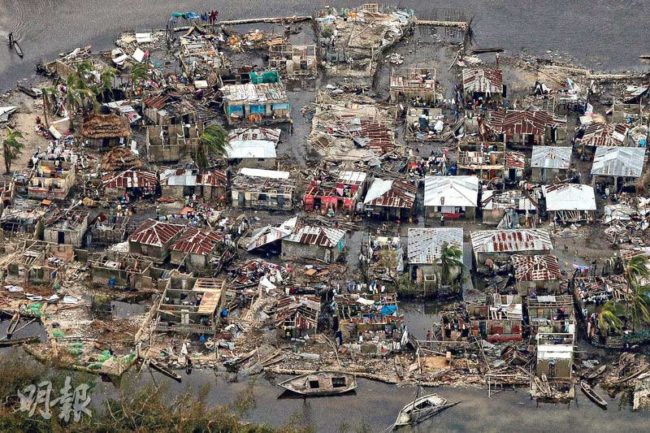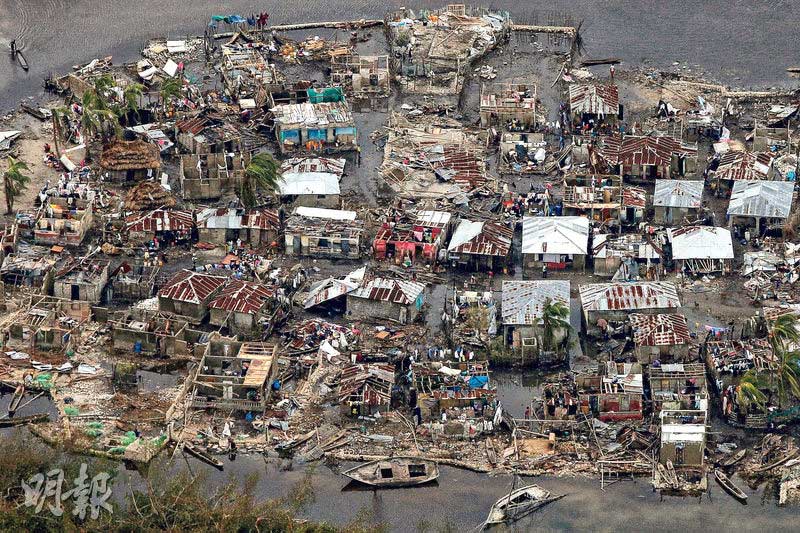 The practical tips on how to really help via a good charity are further down. First comes a bit of fun that points out some of the utterly absurd and quite frankly daft claims from the more extreme fringes of the religious community.
The practical tips on how to really help via a good charity are further down. First comes a bit of fun that points out some of the utterly absurd and quite frankly daft claims from the more extreme fringes of the religious community.
Being faced with such silly claims from con men who are using religion to manipulate people might indeed invoke anger, but a far more potent tool is mockery and laughter. We should ridicule the utterly absurd, and not let it upset us.
When faced with recent weather events it is perhaps inevitable that some truly daft claims will pop up from those that tend be lean upon the eccentric side of their personalities, and so I encourage you to not shake your fist and yell at them, instead deploy the well-deserved laughter that they have worked so hard to earn. Most of the hard work has been done by Hemant Mehta who blogs on a daily basis to highlight such absurd claims, what I’m giving you are links to some examples of the various bits of silliness that he documents in detail.
How to Stop a Hurricane
Apparently some people seriously think that they can control the weather …
- Christian “Prophetess” Kat Kerr thinks she can stop Hurricane Irma by “taking authority over it” and using her scepter to crush the weather. Because Jesus.
- Pastor Lance Wallnau: I Command Hurricane Irma to Go Back Into the Ocean
A subtle hint to those struggling on with this – Number of times that humans have successfully commanded a Hurricane to turn around and go away = exactly zero.
What causes a Hurricane?
Then there are people who use such events to claim that human actions or god causes Hurricanes for a reason …
- Kevin Swanson: We Can Stop Hurricane Irma by Banning Abortion and Gay Marriage
- Kirk Cameron: The Hurricanes Were Sent by God to Make Us More Humble
- Ken Ham: Hurricanes Are “Our Fault” Because a Woman Once Ate An Apple
- Televangelist Jim Bakker: Hurricane Harvey Is God’s “Judgment On America”
So there you go then, apparently the warm moist air over the ocean has nothing to do with it at all. The meteorologists have got it all wrong and so the correct answer is magic and gay marriage.
OK, enough silliness, now let’s change tact and seriously think about how we can actually do something meaningful.
How you can and should really help
You can make a real difference by contributing to aid agencies that are working on a practical level.
Financial Help is the most efficient means
The Center for International Disaster Information, a part of the United States Agency for International Development, offers useful tips on giving in the wake of disasters. Sending money is almost always the most efficient way to help.
Do not self-deploy : work with the aid agencies if you are available to assist
For those who find themselves near damaged communities and want to assist in person, the National Voluntary Organizations Active in Disaster, an association of disaster relief organizations, encourages people not to “self-deploy.” Instead, willing volunteers in Puerto Rico, the U.S. Virgin Islands or Florida can register to be contacted by relief workers by signing up on the association’s website. The Red Cross is also helping to coordinate volunteers.
Via here …
How to give
Think twice before you send any blankets, clothes or toys into a disaster area. Transporting, storing and sorting donated goods can divert resources away from more pressing work.
“I can’t tell you how many times I have been in disaster situations where I’ve seen, literally, just warehouses filled with stuff that people give, just sitting there,” said Britt Lake, the chief program officer for GlobalGiving, a crowdfunding organization that connects donors with local relief organizations.
GlobalGiving’s Irma Relief Fund is accepting donations here. It vets the local organizations it helps fund and is well-regarded by charity watchdogs. (GlobalGiving prioritizes local organizations over the long term, but often steers money toward larger entities like Save the Children or the International Medical Corps during the early days of disaster response.)
Donors can also visit the crowdsourcing website GoFundMe to give money to the Direct Impact Fund, a nonprofit that distributes money to smaller campaigns within the United States and its territories.
GoFundMe also hosts individual crowdfunding campaigns for people and organizations. Those include several based outside the United States in case you would prefer to give directly to, say, The American University of Antigua, which is steering money toward Barbuda, or the Caribbean Eagles, a bikers’ group whose clubhouse was damaged in St. Martin.
(GoFundMe says fraud is rare. It says it works to verify that all funds go to intended recipients, but it cannot always verify the specific claims made by individual campaigners.)
You can also donate directly to larger organizations like Unicef, which will pay special attention to school-age children; Oxfam America, which is preparing for Hurricane Jose as it works on Irma recovery; and the American Red Cross, which has deployed disaster responders and delivered donated blood to hard-hit areas. (A series of reports by ProPublica and NPR called attention to a lack of financial transparency at the Red Cross and accused the organization of serious blunders in its responses to past disasters.)
What to watch out for
To make sure you are giving to a legitimate and effective charity, check whether it has been rated or accredited by an organization like Charity Navigator, Charity Watch or the Better Business Bureau. These might not cover smaller, community-based charitable organizations. But you can read useful tips about choosing a charity from the Federal Trade Commission.
Among its recommendations:
- Do your research;
- don’t wire money or send cash;
- find out a charity’s address and phone number;
- call them if necessary;
- be wary of charities that appear to be new.
Ms. Lake of GlobalGiving said that after major storms blow over and many emergency medical workers leave the scene, it is often up to local organizations to help rebuild communities.
“These are organizations that are often overlooked and underfunded, and they really do know their communities and are there for the long run.”

The Large bulge in the front of Irma cleans on shore remains and sea life in Castries, Saint Lucia, jamming some roads. One death happens in Barbados after a surfer smacked a reef and ruined his narrow part. Read More Hurricane Irma Destruction
https://www.wickedfacts.com/facts-about-hurricane-irma/